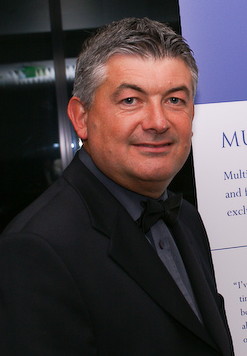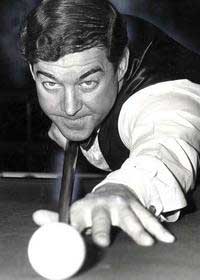Joe Johnson is an English former professional snooker player and regular snooker commentator for Eurosport. As an amateur player, he became the British Under-19 champion in 1971, defeating Tony Knowles in the final. After reaching the finals of the 1978 English Amateur Championship, losing to Terry Griffiths and the 1978 World Amateur Championship, losing to Cliff Wilson, he turned professional in 1979. He reached his first ranking final at the 1983 Professional Players Tournament, losing to Knowles, and reached the semi-finals of the 1985 Classic, losing to Cliff Thorburn.
Raymond Reardon is a Welsh retired professional snooker player. He turned professional in 1967 aged 35 and dominated the sport in the 1970s, winning the World Snooker Championship six times and more than a dozen other tournaments. Reardon was World Champion in 1970, 1973, 1974, 1975, 1976 and 1978, and runner-up in 1982. He won the inaugural Pot Black tournament in 1969, the 1976 Masters and the 1982 Professional Players Tournament.
Pierre "Perrie" Mans was a South African professional snooker player. He first won the South African Professional Championship in 1965 and lifted the title 20 times. Mans won the Benson & Hedges Masters in 1979 and reached the final of the World Championship in 1978.

John Spencer was an English professional snooker player. One of the most dominant players of the 1970s, he won the World Snooker Championship three times, in 1969, 1971 and 1977. He worked as a snooker commentator for the BBC from 1978 to 1998, and served for 25 years on the board of the sport's governing body, the World Professional Billiards and Snooker Association (WPBSA), including a stint as chairman from 1990 until his retirement from the board in 1996.

Clifford Charles Devlin Thorburn is a Canadian retired professional snooker player. Nicknamed "The Grinder" because of his slow, determined style of play, he won the World Snooker Championship in 1980, defeating Alex Higgins 18–16 in the final. He is generally recognised as the sport's first world champion from outside the United Kingdom—since Australian Horace Lindrum's 1952 title is usually disregarded—and he remains the only world champion from the Americas. He was runner-up in two other world championships, losing 21–25 to John Spencer in the 1977 final and 6–18 to Steve Davis in the 1983 final. At the 1983 tournament, Thorburn became the first player to make a maximum break in a World Championship match, achieving the feat in his second-round encounter with Terry Griffiths.

John Stephen Parrott is an English former professional snooker player and television personality. He was a familiar face on the professional snooker circuit during the late 1980s and throughout the 1990s, and remained within the top 16 of the world rankings for fourteen consecutive seasons.

Edward FrancisCharlton, was an Australian professional snooker and English billiards player. He remains the only player to have been world championship runner-up in both snooker and billiards without winning either title. He later became a successful marketer of sporting goods launching a popular brand of billiard room equipment bearing his name.
Anthony Knowles is an English former professional snooker player. He won the 1982 International Open and the 1983 Professional Players Tournament, and was a three times semi-finalist in the World Professional Snooker Championship in the 1980s. His highest world ranking was second, in the 1984/85 season.

The 1985 World Snooker Championship was a ranking professional snooker tournament that took place from 12 to 28 April 1985 at the Crucible Theatre in Sheffield, England. Organised by the World Professional Billiards and Snooker Association (WPBSA), the event was the ninth consecutive World Snooker Championship to be held at the Crucible, the first tournament having taken place in 1977. A five-round qualifying event for the championship was held at the Preston Guild Hall from 29 March to 5 April for 87 players, 16 of whom reached the main stage, where they met the 16 invited seeded players. The tournament was broadcast in the United Kingdom by the BBC, and was sponsored by the Embassy cigarette company. The total prize fund for the event was £250,000, the highest prize pool for any snooker tournament to that date. The winner received £60,000, which was the highest amount ever received by the winner of a snooker event at that time.
The 1988 World Snooker Championship, also known as the 1988 Embassy World Snooker Championship for sponsorship reasons, was a professional snooker tournament that took place from 16 April to 2 May 1988 at the Crucible Theatre in Sheffield, England. Organised by the World Professional Billiards and Snooker Association (WPBSA), it was the sixth and final ranking event of the 1987–88 snooker season and the twelfth consecutive World Snooker Championship to be held at the Crucible, the first tournament there having taken place in 1977.
The 1984 World Snooker Championship was a ranking professional snooker tournament that took place between 21 April and 7 May 1984 at the Crucible Theatre in Sheffield, England. The event was organised by the World Professional Billiards and Snooker Association, and was the eighth consecutive World Snooker Championship to be held at the Crucible since the 1977 event. The event featured 94 participants, of which 78 players competed in a qualifying event held at the Redwood Lodge in Bristol from 1 to 13 April. Of these, 16 players qualified for the main stage in Sheffield, where they met 16 invited seeds. The total prize fund for the event was £200,000, the highest total pool for any snooker tournament at that time; the winner received £44,000.
The 1983 World Snooker Championship was a professional snooker tournament that took place between 16 April and 2 May 1983 at the Crucible Theatre in Sheffield, England. This was the third and final world ranking event of the 1982–83 snooker season following the 1982 Professional Players Tournament. Sixteen seeded players qualified directly for the event, with an additional sixteen players progressing through a two-round qualification round held at the Romiley Forum in Stockport, and Redwood Lodge in Bristol. The winner of the event received £30,000, and the tournament was sponsored by cigarette company Embassy.
The 1981 World Snooker Championship, was a ranking professional snooker tournament which took place from 7 April to 20 April 1981 at the Crucible Theatre in Sheffield, England. The tournament was the 1981 edition of the World Snooker Championship, and was the fifth consecutive world championship to take place at the Crucible Theatre since 1977. It was sanctioned by the World Professional Billiards and Snooker Association. The total prize fund for the tournament was £75,000, of which £20,000 went to the winner.
The 1980 World Snooker Championship, officially known as the 1980 Embassy World Snooker Championship for sponsorship reasons, was a ranking professional snooker tournament that took place from 22 April to 5 May 1980 at the Crucible Theatre in Sheffield, England. The tournament was the 1980 edition of the World Snooker Championship and was the fourth consecutive world championship to take place at the Crucible Theatre since 1977. It was authorised by the World Professional Billiards and Snooker Association. The total prize fund for the tournament was £60,000, of which £15,000 went to the winner.
The 1977 World Snooker Championship is a professional snooker tournament that took place from 18 to 30 April 1977 at the Crucible Theatre in Sheffield. John Spencer won his third World Snooker Championship title by defeating Cliff Thorburn by 25 frames to 21 in the final. It was the first time the championship was held at the Crucible, which has remained as the venue for the Championship. The tournament was sponsored by cigarette manufacturer Embassy.
Warren King is a former professional Australian snooker player who was active during the 1980s and 1990s. He reached his highest ranking position, 35th, for the 1985/1986 season, and was the runner-up in the 1990 Classic, where he lost 6–10 to Steve James.
Paddy Morgan is an Australian former professional snooker and English billiards player. He was born in Belfast, and moved to Coventry in 1960. Following an amateur career in which he won junior and national titles in both sports, and reached the semi-finals of the 1968 World Amateur Snooker Championship, he emigrated to Australia in 1969. He became a professional player in 1970 and competed in the World Snooker Championship for the first time in the 1971 tournament.
Dave Martin is a retired English snooker player. He became a professional player in 1980, and later reached the semi-finals at the 1981 International Open. He was runner-up to Steve Davis at the 1984 International Masters.
Steve Duggan is an English former professional snooker player, who competed on the professional snooker circuit from 1983 to 1996. He reached the quarter-finals of the 1985 Matchroom Trophy.
The 1982 World Snooker Championship was a professional snooker tournament that took place between 30 April and 16 May 1982 at the Crucible Theatre, in Sheffield, England. It was the only event of the 1981–82 snooker season which carried world ranking points. Embassy, a British cigarette company, sponsored the tournament, and the World Professional Billiards and Snooker Association (WPBSA) governed the organisation of the event. It had a prize fund of £110,000, with the winner receiving £25,000.




